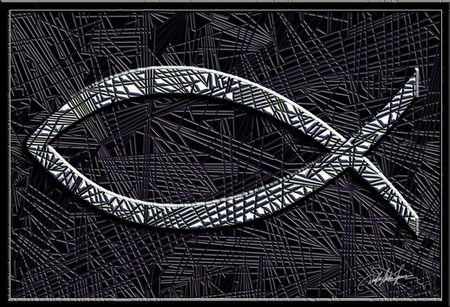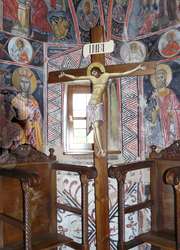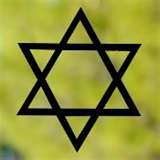



A religion is a set of beliefs concerning the cause, nature, and purpose of the universe, especially when considered as the creation of a supernatural agency or agencies, usually involving devotional and ritual observances, and often containing a moral code governing the conduct of human affairs. The practices and beliefs listed here represent some of the faith, worship and rituals of the followers or acknowledgement of Jesus Christ around the world, respectively.
The Orthodox Christian Tradition: Predominantly believes that Jesus is the "Son of God" (generally meaning that he is God the Son, the second person in the Trinity (The Father, The Son and The Holy Spirit), who came to provide salvation and reconciliation with God by his death for their sins. His death and resurrection are commonly celebrated in Spring as the celebration of Easter. Other systems or cultures of belief include;
The Church of Jesus Christ of Latter-day Saints (abbreviated as the LDS Church, commonly referred to as the Mormon Church) is a restorationist Christian church, and the largest denomination originating from the Latter Day Saint movement founded by Joseph Smith, Jr. Founded in Upstate New York in 1830, the church is headquartered in Salt Lake City, Utah, and has established congregations (called wards or branches) worldwide.
The Symbol. The Greek word for fish is "ixthus" or "icthus." The
Christian fish symbol that many Christians place on their cars is known
as the “ixthus.” Five Greek letters form the word “ixthus,” and those
letters inside the fish form an acrostic which is a message that
Christians clearly identified with. The first letter represented the
word Jesus. The second letter represented the word Christ, the next two,
God Son, and the final letter represented the word Savior. This adds up
to “Jesus Christ is God’s Son, the Savior.” During the early days of
Christianity, Christians were often put to death for practicing their
faith, so they worshiped in secret places. A fish painted on the outside
door of a house let other Christians know that they would be safe and
welcome inside. The Christian fish symbol is now often used to identify
Christians and/or Christian businesses.
Fish were also a staple in the diet of Galilee.
The Catholic Traditon: Cathechism of the Catholic Church; Catholics have various sources of authority: The Bible, Tradition, the Creeds, the Bishops, and the Pope, among others. Catholics believe that Jesus is a single person, and that the human and divine in Jesus are fully and completely united, not divided in any way. When Jesus healed, both the human and divine nature in Jesus healed. When Jesus writhed in pain, God and human writhed in pain.
THE Apostolic Tradition: Christ the Lord, in whom the entire Revelation of the most high God is summed up, commanded the apostles to preach the Gospel, which had been promised beforehand by the prophets, and which he fulfilled in his own person and promulgated with his own lips. In preaching the Gospel, they were to communicate the gifts of God to all men. This Gospel was to be the source of all saving truth and moral discipline.
The Protestant/Methodism Tradition: The United Methodist Church (UMC) seeks to create disciples for Christ through outreach, evangelism, and through seeking holiness through the process of sanctification. With a focus on triune worship, United Methodists seek to bring honor to God by following the model of Jesus Christ, which is made possible by the power of the Holy Spirit. The flame in the church logo represents the work of the Holy Spirit in the world, which is seen in believers through spiritual gifts. The two parts of the flame represent the predecessor denominations, the Methodist Church and the Evangelical United Brethren, and are united at the base symbolizing the 1968 merger. The United Methodist Church understands itself to be part of the holy catholic (universal) church as it recognizes the historic ecumenical creeds, the Apostle's Creed and the Nicene Creed; they are used frequently in services of worship The Book of Discipline also recognizes the importance of the Chalcedonian Creed of the Council of Chalcedon as well as;
- Triune God. God is one God in three persons: Father, Son and Holy Spirit (Holy Ghost).
- Scripture. The writings in the Old Testament and New Testament are the inspired word of God.
- Sin. While human beings were intended to bear the image of God, all humans are sinners for whom that image is distorted. Sin estranges us from God and corrupts human nature such that we cannot heal or save ourselves.
- Salvation through Jesus Christ. God's redeeming love is active to save sinners through Jesus' incarnate life and teachings, through his atoning death, his resurrection, his sovereign presence through history, and his promised return.
- Sacraments. The UMC recognizes only two sacraments: Holy Baptism and Holy Communion. Other rites such as Confirmation, Ordination, Holy Matrimony, Funerals, and Anointing of the Sick are performed but are not considered sacraments. In Holy Baptism, the Church believes that "Baptism is not only a sign of profession and mark of difference whereby Christians are distinguished from others that are not baptized; but it is also a sign of regeneration or the new birth. It believes that Baptism is a sacrament in which God initiates a covenant with individuals, people become a part of the Church, is not to be repeated, and is a means of grace. The United Methodist Church generally practices Baptism by sprinkling, pouring, or immersion and recognizes Trinitarian formula baptisms from other Christian denominations in good standing. The United Methodist Church affirms the real presence of Christ in Holy Communion, (the bread is an effectual sign of His body crucified on the cross and the cup is an effectual sign of His blood shed for humanity), believes that the celebration is an amnesis of Jesus’ death, believes the sacrament to be a means of grace, and practices open communion.
- Free will. The UMC believes that people, while corrupted by sin, are free to make their own choices because of God's divine grace.
- Grace. The UMC believes that God gives unmerited favor freely to all people, though it may be resisted.
In Islam, Muslim history involves the history of the Islamic faith as a religion and as a social institution. According to Islamic Faith and the Holy Text, it is wrong to say that the history of Islam began in Arabia with Muslim Prophet Muhammad's first recitations of the Qur'an in the 7th century, but with Adam and Eve. They are considered the First Apostles of God. Later, Abraham, Moses and Jesus all taught the same faith as prophets, albeit in different regions or at different points of time. Jesus (Arabic: عيسى, commonly transliterated as Isa) is considered one of God's important prophets, a bringer of scripture, and a worker of miracles. Jesus is also called "Messiah", but Islam does not teach that he was divine. Islam teaches that Jesus ascended bodily to heaven without experiencing the crucifixion and resurrection
The Judaism Tradition: (from the Latin Iudaismus, derived from the Greek Ioudaïsmos, and ultimately from the Hebrew יהודה, Yehudah, "Judah" in Hebrew: יַהֲדוּת, Yahadut) is a set of beliefs and practices originating in the Hebrew Bible, also known as the Tanakh, and explored in later texts such as the Talmud . Those of the Jewish faith consider Judaism to be the expression of the covenantal relationship God developed with the Children of Israel—originally a group of around a dozen tribes with descent from the Biblical patriarch Jacob—and later, the Jewish people. According to most branches, God revealed his laws and commandments to Moses on Mount Sinai in the form of both the Written and Oral Torah. However, Karaite Judaism maintains that only the Written Torah was revealed, and liberal movements such as Humanistic Judaism may be nontheistic. Judaism has a historical continuity spanning more than 3000 years. It is one of the oldest monotheistic religions, and the oldest to survive into the present day. Its texts, traditions and values have inspired later Abrahamic religions, including Christianity, Islam and the Baha'i Faith. Many aspects of Judaism have also directly or indirectly influenced secular Western ethics and civil law.